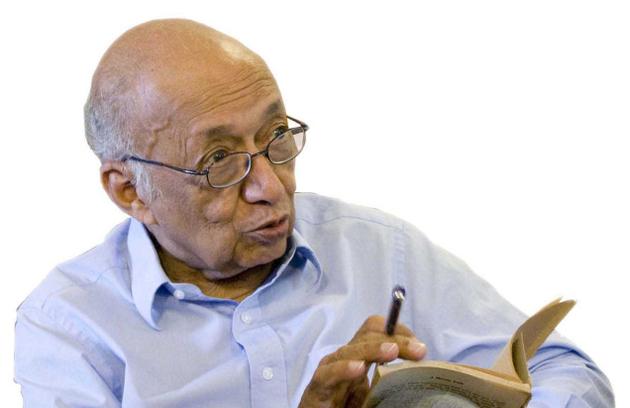Excerpts of a radio interview with Victor Rangel-Ribeiro
At 89, he’s one of Goa’s greatest treasures
The morning I walked into All India Radio’s broadcast station in Altinho with Victor on my arm, it felt as though one was walking the red carpet at the Oscars in LA. Having arrived early, our AIR collaborator Savio, gently scolded me for not giving them ample time to ‘prepare’, after which, we were whisked into the Chief’s office (Madhur Borcar) and served refreshments. A photographer tiptoed in and took several shots of everyone beaming, proud to be in the same frame as one of Goa’s most talented and much loved citizens.
This home-grown award-winning author had his first novel, Tivolem, published at the tender age of 72, which went on to win a literary prize and was studied as part of the curriculum at Yale, and now at Goa University. The second book, Loving Ayesha and Other Stories, with illustrations by Mario Miranda, made its presence felt on India’s bestseller lists. Victor has likewise succeeded in showcasing his other great passion, music, by playing maestro to orchestras in the international arena, covering concerts for the New York Times, penning a major book on Baroque music, being appointed Music Director of the Beethoven Society of New York, plus running a unique classical music store in New York City and also at the renowned Aspen Music Festival in Colorado. Phew! I’m exhausted from just typing out his list of achievements and wonder what the magic formula is for still having the energy and enthusiasm to put yourself out there (Victor turns 90 in 2015). Let’s find out what makes him tick.

Victor and Lea Rangel-Ribeiro
What tempted you to start writing?
My family members were all voracious readers, so in order to be a part of the literary ambience at home, I used to lie flat on the tiled floor, with a big book in front of me pretending to read. Once my keen interest in reading was noticed, I began receiving books as gifts instead of toys, even on my birthday. The desire to write developed naturally from there; I thought that if other people were writing stories that I liked to read, perhaps they might enjoy reading the stories that kept churning in my head.
How do you think one can improve writing skills?
The main obstacle is that most amateurs – whether living in Goa or Greenland – believe their work is perfect. Pride and smugness get in the way of learning. A seasoned writer knows there is always room for improvement. Whilst working with the newspapers in Bombay, most of what I wrote got published, which actually spoils you. By contrast, in the US, while the New York Times published my concert reviews and articles on music, the magazines that I sent my stories to all got sent back. I came to look upon those rejections as an invitation to improve, and began to revise and rewrite over and over again. Eventually, this led to success.
However, a writer does not exist in a vacuum, nor does he write in a vacuum. To develop a sense of style, it is important to read constantly, especially the superb writings of such authors as Mulk Raj Anand, Raja Rao, Anita Desai, and Arundathi Roy – all profound and elegant writings where the language is rooted in our Indian soil.
Joining or forming a writers group, is another useful aid, because I’m convinced that the energy created at such meetings, where members critique and encourage each other, is a very helpful tool. The Goa Writers Group, of which I’m proud to be a member, is one such example – some of its members have achieved national recognition, while others have won international awards for specialized publications. I formed a writers group at St. Xavier’s College in 1941, along with John Correia Afonso, and since the biggest incentive for any writer is to be published, we started our own typewritten magazine as well.
Please share a poem that especially moves you.
William Butler Yeats’ “Aedh wishes for the cloths of heaven”
Had I the heavens’ embroidered cloths,
Enwrought with golden and silver light
The blue and the dim and the dark cloths
Of night and light and the half light,
I would spread the cloths under your feet.
But I, being poor, have only my dreams,
I have spread my dreams under your feet.
Tread softly because you tread on my dreams
During my college years in Bombay, I was a poor young man in love with a girl from a well-to-do family and recited this poem to her. It worked for two years, after which she realized that I had really offered her an option; so she chose the cloths of heaven in preference to my dreams, and became a nun!

Victor Rangel-Ribeiro sharing a lighter moment with friends
Who is your favourite composer?
That’s like asking me for the name of a favourite child. There isn’t just one. Beethoven for passion, Bach for serenity and spirituality, Schubert for the love songs and the unending flow of melody, and Mozart to remind me that perfection can exist.
During your stint as the first Indian copy chief at J.Walter Thompson in Bombay, did you encounter any racism?
Upon discovering that my salary was lower than the previous ‘white’ chief, I asked for an explanation and was told that Indians had a lower standard of living and could therefore make do with less. My comeback to that was to draw a direct comparison between our relative standards of living – I had two apartments to his one, I would take a taxi to work while he arrived in a car held together by chewing gum and Scotch tape, and finally, he only had a cook and a part-time maid while my household had three people as live-in domestic staff. So the company raised my pay but it still didn’t match what my predecessor had been paid.
Let’s talk about your life in America and what makes you keep returning to Goa.
We moved to the US at the generous invitation of my sister Lyra, who suggested that Lea, my pianist wife, enrol in the Juilliard School of Music as she wanted to develop a concert career. After the first few years Lea ran into visa problems because the Indian quota was closed, and was forced to ride the Stanton Island ferry with our baby whenever the immigration officials came calling. It was a cat-and-mouse game in which I suspect the cat was not too anxious to catch the mouse!
I enrolled in Teachers College, Columbia University, and after graduation taught at two universities but the years I spent educating troubled teens in Harlem were among the most rewarding. The first time I walked into a classroom there, a voice called out, “Victor, you’re brain damaged!” So I promptly yelled back, “What took you so long to find out?”
But I believe that no matter what you do overseas, one must make time to return to the home state and help improve things locally. I do this by organizing writing and editing workshops and also working with young musicians. My sisters came and gave back in more substantive ways; the focus of all three was on education, health care, village uplift, and the empowerment of women.
Is there a particular person you feel has had an influence on your way of life?
While studying at St. Xavier’s in Bombay, the principal, Father Coyne, tried to make a Jesuit out of me but I was too busy chasing girls. But he did advocate Socrates’ doctrine that ‘an unexamined life is not worth living’ and taught me to focus on that by asking myself three questions every night: How have I touched the life of someone I know? How have I touched the life of someone I don’t know? What improvements have I made today to my God-given talents? “Victor,” he said, “if you don’t have a positive answer to any of these questions, don’t go to sleep until you’ve fixed that!” That was seventy years ago, but I still follow his precepts.
What are the most significant changes you’ve noticed between the 1930s and today?
The greatest changes involve inventions and personal attitudes; unfortunately, the same technical advancements that make living easier have also greatly reduced intimacy and personal interaction. One example: We used to handwrite letters and I have hundreds of such letters in my home, written by family members and close friends. Even a glance at any one of these intimate notes can stir up emotions and roll the years away― one can almost hear the voice that has been silent for years, and feel the touch of a loving hand that’s long been gone. By contrast, emails, though also packed with memories, do not conjure up a similar sense of presence.
Your marriage lasted almost 6 decades―what’s the secret of its success?
I never forgot that when she was very young, Lea trusted her life in my hands. For me it was love at first sight when I saw her at a radio concert organized by AIR celebrating J.S. Bach. I even remember the day: August 27, 1950. But nobody could tell me who she was, and all my attempts to find her were unsuccessful. Then one day I was invited to dinner by a musician whose son I had written about; I rang the doorbell, and Lea opened the door and changed my life forever and for the better. For the four years that I courted her, and the fifty-seven that we were married, Lea Vaz was my sun, my moon, and stars, and the centre of my universe.
Wrapping up the interview, I restated my original question: how have you maintained your zest for life? “Obviously good genes help,” he said.“But the key is to keep reinventing yourself to avoid boredom. The three questions that Fr. Coyne so wisely taught me to ask myself―two of the questions keep me continually involved in the lives of other people, a human and humane circle that keeps expanding. And the third one, helps you acquire a variety of skills and interests. Boredom comes from doing the same thing over and over again; if you can move smoothly from one interest to another, you neither get bored nor tired.”
Thank you Maestro.



